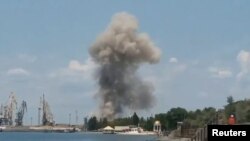Latest developments:
- The British Defense Ministry said in its daily intelligence update about Russia’s invasion of Ukraine that it is “likely" that Russia has “gained a temporary advantage “in southern Ukraine because of its attack helicopters “employing longer-range missiles against ground targets.” The update said that 20 extra Russian helicopters have been deployed to Berdyansk Airport since the start of Ukraine’s counter offensive in southern Ukraine.
- The head of the International Atomic Energy Agency, Rafael Grossi, is expected to visit Moscow next week, the Interfax news agency reports, citing the head of Russia's nuclear state company Rosatom. Grossi visited the Russian-controlled Zaporizhzhia nuclear power plant in southern Ukraine Thursday, after last week’s collapse of the Kakhovka dam, whose reservoir feeds the nuclear facility's cooling ponds.
- Russia's Foreign Affairs Ministry said Friday it had summoned the Australian ambassador after Canberra canceled the lease of a land plot where a new Russian embassy complex was being built. "The Russian side intends to use all necessary mechanisms to protect its interests, including possible retaliatory measures," the ministry said.
Russia said Saturday it repelled Ukrainian drones overnight over an oil refinery in the southern border region of Bryansk.
Alexander Bogomaz, governor of the Bryansk region, said, "Russian air defense systems repelled an overnight attack by the Ukrainian armed forces on the 'Druzhba' oil refinery in the district of Novozybkov." He said three drones were destroyed.
A delegation of African leaders is set to meet with Russian President Vladimir Putin on Saturday in St. Petersburg to possibly broker a deal to end the Ukraine-Russia conflict.
The group met Friday with Ukrainian President Volodymyr Zelenskyy.
Members of the delegation include South African President Cyril Ramaphosa, Senegalese President Macky Sall, Zambian President Hakainde Hichilema and Comoros President Azali Assoumani, who currently leads the African Union.
Three other African presidents were set to participate in the peace mission, but instead sent their representatives from Congo, Egypt and Uganda.
Their meeting with Zelenskyy was marred by blaring defense sirens as they began their meeting.
Putin has confirmed that Russia’s deployment of tactical nuclear weapons to Belarus has already happened, reminding the West that it could not inflict a strategic defeat on Russia.
"The first nuclear warheads were delivered to the territory of Belarus. But only the first ones, the first part. But we will do this job completely by the end of the summer or by the end of the year," he said.
Speaking Friday at Russia's economic forum in St. Petersburg, Putin stressed he saw no need for Russia to resort to nuclear weapons, for now. His move delivering shorter-range nuclear weapons to Belarus, which could be used on the battlefield, was intended as a warning to the West about arming and supporting Ukraine, the Russian leader said.
The White House denounced Putin’s comments and said the United States had made no adjustments to its nuclear position in response to the rhetoric.
Putin warned Friday there is a "serious danger" that the NATO military alliance could be pulled further into Russia’s war on Ukraine. He made those comments during a plenary session of Russia's flagship St. Petersburg International Economic Forum, where he touted Russia’s economy despite heavy international sanctions imposed because of the war in Ukraine. Western journalists were banned from the event.
Putin also alleged that Ukraine is running out of its own military equipment, making it totally dependent on military hardware supplied by the West. “Everything on which they fight and everything that they use is brought in from the outside. Well, you can't fight like that for long," he said.
Additionally, he asserted that Ukraine had failed to make progress in its counteroffensive, adding its army had "no chance" against Russia's.
Independent military analysts say Ukraine has outperformed Russia's much larger army in the nearly 16 months of the war, forcing it to retreat around the cities of Kyiv, Kharkiv and Kherson.
US humanitarian assistance
The United States on Friday announced additional humanitarian assistance of $205 million for Ukraine that will provide critical support such as food, safe water, accessible shelter and more for Ukraine.
“The U.S. response is advancing Ukraine’s overall security, economic recovery, energy security and capacity to cope with the humanitarian crisis created by Russia’s war. We welcome the contributions of other donors toward this crisis response and urge yet more donors to generously support the serious humanitarian needs in Ukraine and the region,” Secretary of State Antony Blinken said.
The U.S. aid package brings the total humanitarian assistance for Ukraine to more than $605 million during fiscal year 2023. Since February 2022, the United States has provided more than $2.1 billion in humanitarian assistance for Ukraine.
The European Commission will propose additional funding to support Ukraine in the coming years. This year, the EU is providing $19.8 billion but aims at a longer-term solution to provide Kyiv with financing certainty as it repels Russia's invasion.
“The EU is ready to provide Ukraine with sustainable and predictable financial support beyond 2023 to maintain both macro-financial stability and support reconstruction," European Commission Executive Vice President Valdis Dombrovskis said Friday.
Some information for this story came from The Associated Press, Agence France-Presse and Reuters.





Forum